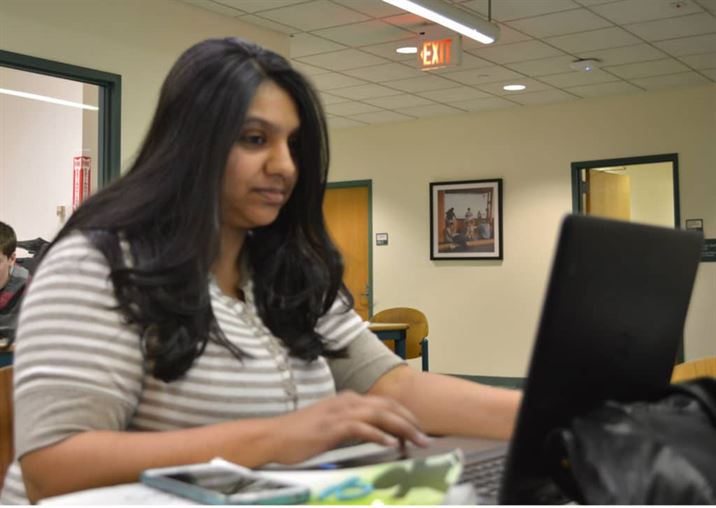
Aqueela Chaudhry, a Muslim student at Montclair State, said her entire family made it to the United States before Trump’s ban was implemented.
Photo Credit: Therese Sheridan
President Donald Trump’s Executive Order preventing people from seven predominantly Muslim countries from entering the United States for 90 days has ignited reactions from many Montclair State students, faculty and staff.
President Susan Cole sent out a campus-wide statement Tuesday in regard to the ban. In the e-mail, she emphasized the value of a diverse campus community and promised that the university will continue “to foster a campus that is open and welcoming and that does not categorize individuals by characteristics, such as race, nationality or religion.”
A number of Montclair State University professors and students are directly affected by the ban.
Fadi Hilani, an international visiting scholar from Syria who teaches in the linguistics department at Montclair State, said that he will not be able to go abroad for international conferences or visit his family back in Syria.
Although the ban signed by the Trump administration is a “clear case of discrimination” under the Obama administration, Hilani tried time and again to invite family members from Syria to help out his wife with their two small children, but their visa applications were denied every time. “[Under the Obama administration] the restrictions were there but they were unannounced,” said Hilani.
Upon asking how the ban makes him feel, he answered that it is an uncomfortable feeling knowing that he is safe in this country and is doing his work, but he can’t have people over to come visit him and he can’t go and visit them. “Things were bad in the first place, but it certainly became worse after the ban,” said Hilani.
Sophomore graphic design major and Iranian green card-holder, Sona Bayrami, is frustrated by the ban. Bayrami usually visits her extended family in Iran every summer, but because of the ban she will most likely not be able to visit them. “America is about accepting people no matter where they are from,” said Bayrami.
Mazooz Sehwail, professor of Arabic and the coordinator for the Arabic program, said that he recently spoke to a lawyer from a civic organization that defends civil rights in the United States. The lawyer advised green card-holders from those banned countries to avoid traveling.
Sehwail’s predictions are that the list of banned countries will expand. “I think [Trump] will expand it until he reaches all countries that have majority Muslims,” said Sehwail.
Some Trump supporters think that the president has gone too far with the travel ban. Sophomore justice studies major Zachary Finn, who was a Trump supporter during the Montclair State student protests after the election, said that he thinks the ban is wrong.
“I don’t think terrorists should be allowed in this country, but we don’t know who is and who isn’t, so it’s hard to differentiate,” he said.
Others support Trump’s decision because of national security reasons. Matthew Schmalenberger, a junior economics major, said that the security of the American people should come before any other country. His message to Trump would be to keep on going, although he doesn’t agree with his economic policies.
“However, the other things he has been doing for this country have been great,” said Schmalenberger.
The order also states that refugees from anywhere cannot enter the U.S. for 120 days; for Syrian refugees the rescue programs have been suspended indefinitely.
In reaction to the suspension, Dr. Lois Oppenheim, the chairperson of the Department of Modern Languages and Literatures, is planning on bringing back a rescue program called Emergency Committee on Relief and Immigration of the American Psychoanalytic Association.
“Between 1938 and 1943, they found ways to financially assist individuals both in the United States and outside this country, to offer affidavits to those who requested them, and to facilitate immigration of Austrian psychoanalysts to the U.S. and other countries as well,” said Oppenheim.
She hopes to do the same for some of the refugees that are not able to enter the country due to the ban.
Some Montclair State University professors, like film professor Lisa Raven, have organized discussion and support groups.



